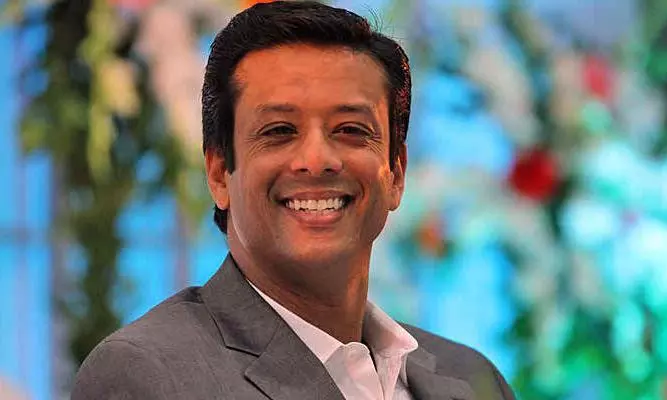
- Home
- India
- World
- Premium
- THE FEDERAL SPECIAL
- Analysis
- States
- Perspective
- Videos
- Sports
- Education
- Entertainment
- Elections
- Features
- Health
- Business
- Series
- In memoriam: Sheikh Mujibur Rahman
- Bishnoi's Men
- NEET TANGLE
- Economy Series
- Earth Day
- Kashmir’s Frozen Turbulence
- India@75
- The legend of Ramjanmabhoomi
- Liberalisation@30
- How to tame a dragon
- Celebrating biodiversity
- Farm Matters
- 50 days of solitude
- Bringing Migrants Home
- Budget 2020
- Jharkhand Votes
- The Federal Investigates
- The Federal Impact
- Vanishing Sand
- Gandhi @ 150
- Andhra Today
- Field report
- Operation Gulmarg
- Pandemic @1 Mn in India
- The Federal Year-End
- The Zero Year
- Science
- Brand studio
- Newsletter
- Elections 2024
- Events
- Home
- IndiaIndia
- World
- Analysis
- StatesStates
- PerspectivePerspective
- VideosVideos
- Sports
- Education
- Entertainment
- ElectionsElections
- Features
- Health
- BusinessBusiness
- Premium
- Loading...
Premium - Events

By saying India ought to ensure fresh elections in Bangladesh, Joy has landed Delhi in an embarrassing situation that may impact its tenuous relations with Dhaka
Deposed Bangladesh Prime Minister Sheikh Hasina's son Sajeeb Wajed Joy has been quoted as saying that India has to ensure fresh elections in Bangladesh within three months.
Bangladesh is a sovereign country and nothing would hurt its proud people more than overt foreign interference. So, how could Joy say this?
When Hasina allegedly blamed her ouster on US machinations, Washington was quick to deny the accusation because it is mindful of public opinion in Bangladesh. It can be no different with India, which is already seen as some kind of a villain by those in Bangladesh who resented Hasina's authoritarian tendencies and felt she could get away with it because of India's unstinting backing.
Embarrassing New Delhi
How can Joy ask India to interfere and push the new interim government in Bangladesh to hold elections within a certain time frame? It is not for India to decide when Bangladesh should go to the polls.
India did pitch for a return to democracy in Bangladesh in 2008 through the late Pranab Mukherjee after the military-backed caretaker had clearly exceeded its brief and hung on to power for two years.
But that was another time, when the public mood was clearly favouring immediate elections.
Another Abdul Momen?
Joy is putting India in an embarrassing position with his statement, which is circulating in social media and which he has made no attempt to deny.
The kind of embarrassment that Hasina's one-time foreign minister Abdul Momen caused when, on return to Dhaka from Delhi, he publicly announced that he had requested India to help the Awami League in the next parliamentary elections so that it could stay in power.
Since his mother fled Bangladesh, Joy has been a source of confusion.
Initially he went on social media to claim his mother would never return to Bangladesh because she was hurt over how 'a minority ' had risen against her government despite her hard work to develop a once poor country. Days later, after much anger in the Awami League rank and file, Joy took a completely different line – that his mother would return the moment the elections were announced, hinting she was still keen to lead the party.
Will elections help Awami League?
Now, he has gone one step further to draw India into holding early elections. Many party stalwarts staying behind to fight it out in these troubled times wonder why Joy is pitching for early elections when the Awami League is clearly in total disarray and the only likely beneficiary of early elections would possibly be the BNP-Jamaat-e-Islami alliance which is upbeat after Hasina's ouster.
The confusion is all the more profound because Joy claims to have talked to her mother and has even put out a statement on her behalf saying she wants justice from her people and that she lashed out at the desecration of the statues of Sheikh Mujibur Rahman.
India has been comfortable with the Awami League in power but it cannot and must not be seen as trying to influence electoral outcomes – or pushing for elections within a certain time frame. That is for Bangladesh's people and government to decide.
More harm than good
People like Joy and Momen cause more harm to Indian interests in Bangladesh than even sworn anti-Indian elements because they reinforce a perception that India takes over the country when the Awami League is in power.
ShashiTharoor has rightly said that India's first priority should be people-to-people relations, then state-to-state relations and then relations with individuals and groups.
There is no denying the long history of India's special relations with the Awami League – or for that matter the Nepali Congress – and their leaders. But there are red lines that should not be crossed.
It is to honour such relations that India provided temporary shelter to Sheikh Hasina at short notice when she fled her country at the peak of the students’ anti-quota movement which had turned into a mass upsurge after a brutal police crackdown in which hundreds died.
Hasina in trouble
With protestors closing in on her residence and her army reluctant to fire on them, Hasina was in great hurry to leave.
The initial impression she gave was she would like to move to the US (where her son stays) or the UK (where her sister Rehana's family stays) and that India was only a transit point because she had no time to organise her relocation to her final destination.
The students who spearheaded the protests were clearly upset with Hasina leaving because they want her to stand trial for ordering the police crackdown in which hundreds of students and commoners died. By sheltering Hasina, India has clearly upset these gen-next leaders, some of whom have secured responsibilities in the interim government led by Nobel Laureate Muhammed Yunus.
A bold Bangladeshi statement
The man in charge of the foreign department of the interim government is a professional diplomat and former foreign secretary Touhid Hussain. Though he is not an elected minister, his career graph is somewhat like India's foreign minister S Jaishankar.
I knew Touhid well when he served as Bangladesh deputy high commissioner in Kolkata. So, I was not surprised when he went on record to say Hasina's stay in India will not impact on bilateral relations between the two countries.
“Both countries have long-term interests which is not dependent on any single person," he told journalists. That was a bold professional gesture under the present circumstances.
Bangladesh remains tense
Touhid's colleague Brigadier General (retd) Shakhawat Hossain, who is handling the home department, faced angry students on Wednesday for some comments a day earlier that was seen as "friendly" towards the Awami League. The former soldier had said the Awami League is the "country's biggest party and still had very good leaders".
Touhid and his boss Muhammed Yunus may have tried to address Indian concerns over attacks on Hindus and attempted to put New Delhi at ease after Indian Prime Minister Narendra Modi reached out to the interim government. But the interim government, under student and opposition pressure, has already initiated criminal cases against Sheikh Hasina.
Criminal cases against Hasina
On Wednesday, a case was filed against Hasina and eight other members of her now-dissolved cabinet as well as police officers on charges of “crimes against humanity” and “genocide” at the local International Crimes Tribunal.
The tribunal was formed by the then Awami League government of Hasina in 2010 to prosecute those who had opposed Bangladesh’s war of independence in 1971 and committed horrific crimes in support of the Pakistan army.
So, the interim government is all set to turn the tables on Hasina. Once convicted, it is easy to guess the interim government will seek Hasina's extradition to face trial.
That is when India will be caught between the rock and the hard place. New Delhi cannot be seen as throwing a trusted ally to the wolves; but can it afford upsetting the current government in Dhaka with so much at stake?
Uncertainty in New Delhi
Though Touhid Hussain said Hasina's stay in India will not affect bilateral ties, he made it clear that he will go by the law department advice on seeking to bring her back for legal action. He did privately express consternation over Hasina’s statement from Indian soil to the Indian high commissioner in Dhaka, Pranay Verma.
The law department in the interim government is handled by a law professor, Asif Nazrul, who is seen as the master planner of the student agitation. Asif has indicated that the government will not spare those responsible for the brutal suppression.
So, there is much uncertainty for New Delhi unless Hasina moves to some other country soon enough. The US has revoked her visas and the UK has raised procedural issues to deny her entry. She may still have options like Finland but is she interested?
Hasina, Joy not helping India
By issuing statements and communicating with her party colleagues from her safe house in Delhi, Hasina may be giving the impression that India is okay with what she is doing.

